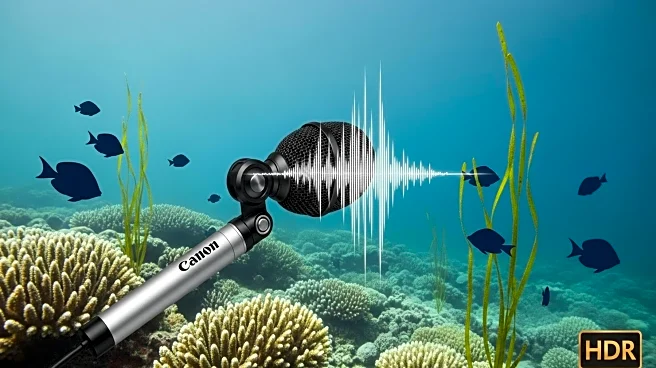What's Happening?
Scientists are utilizing advanced technology to record and analyze the sounds made by fish underwater. This research aims to improve understanding of aquatic life and aid in the conservation of marine ecosystems, particularly coral reefs. The study involves deploying 360-degree cameras and microphones in reefs off Hawaii and Curaçao to capture the diverse sounds fish make, such as thumps, honks, burps, and grunts. These sounds are less sophisticated than birdsong but are crucial for fish communication. The research, led by marine biologist Aaron Rice and bioacoustician Marc Dantzker, seeks to build a comprehensive library of fish sounds to monitor marine biodiversity non-invasively.
Why It's Important?
The ability to record and analyze fish sounds has significant implications for marine conservation. By understanding the acoustic behavior of fish, scientists can monitor the health of coral reefs and track the presence of rare or invasive species. This method offers a non-destructive alternative to traditional biodiversity assessment techniques, which often involve harmful practices like dragging nets or using electricity. The data collected can inform conservation strategies and help manage fishing seasons by identifying mating periods. As coral reefs face threats from climate change and ocean acidification, this research provides a vital tool for protecting these ecosystems.
What's Next?
The research team plans to expand their study to other regions, including Indonesia, and continue developing their recording technology. They aim to create a second-generation device with more cameras and hydrophones to enhance data collection. Additionally, the team is working on training artificial intelligence to automate the analysis of fish sounds, which could significantly speed up the process. The ultimate goal is to establish a global network of underwater acoustic monitors to support marine conservation efforts worldwide.
Beyond the Headlines
This research highlights the innovative use of technology in environmental conservation. By leveraging passive acoustic monitoring, scientists can gain insights into marine life without disturbing natural habitats. The study also underscores the urgency of protecting coral reefs, which are vital for coastal protection and food security. As climate change continues to threaten these ecosystems, integrating technology into conservation strategies becomes increasingly important.









